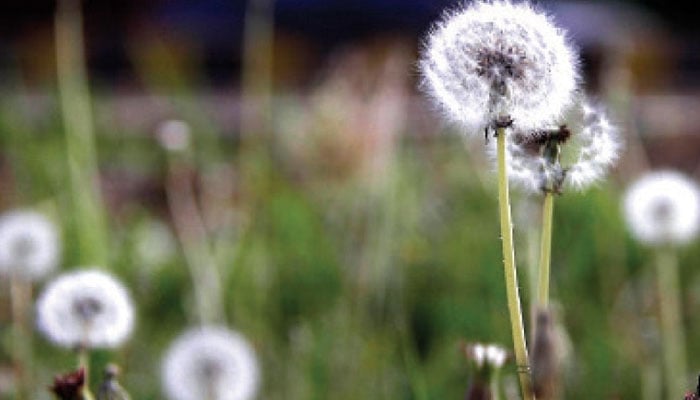Pollen to start increasing in Islamabad from March
one should not leave the house without wearing a mask
ISLAMABAD: From the first week of March to the middle of June, pollen in the federal capital will increase to an alarming level.
The Department of Meteorology, Rawalpindi Medical University and head of Pediatrics Department, Benazir Hospital, have given a unanimous opinion that from the first week of March to the middle of April, allergy sufferers will have to keep the windows of their homes and cars closed.
“If you have to go out of home, make sure to take 100% precautionary measures,” experts said, adding that pollen has started to be produced due to wild mulberry in Islamabad. On February 25, according to the Meteorological Department, the pollen count increased to only 96, while it had gone up to 45,000 in the middle of 2015. According to Meteorological Department, paper mulberry will produce pollen particles in March-April and from July to September these plants will release pollen. Medical officials say that wild mulberry trees in the federal capital are in such numbers that they are producing pollen counts. No other city in Pakistan produces even one percent of its pollen. In this way, the federal capital has become the top among the capitals of the world where the pollen count is the highest. They said the tree pollen season will be from the first week of March to the end of June.
According to Vice Chancellor of Rawalpindi Medical University Prof. Dr. Muhammad Umar, head of Pediatrics Department of Benazir Hospital Prof. Dr. Rai Mohammad Asghar, former head of Benazir Hospital Rawalpindi and ENT specialist Prof. Dr. Muhammad Aslam Chaudhry, pollen will be at the extremes in June, July and August. Pollen is at its highest before sunrise. Pollen sufferers experience difficulty breathing for two hours after sunrise. After 2pm, the amount of pollen decreases. The reason for this is that till 9am pollen stays up to three feet above the ground. From 9 am to 4 pm, it rises eight to ten foot above the ground due to the heat of the sun. According to medical experts, pollen count will increase during dry, hot and windy days. In such weather, allergy sufferers should stay indoors. As a result of pollen disease, the nose starts to run, in some people it starts to block the nasopharynx. The eyes become red, throat itches, cough occurs and the patient feels mild fever. According to medical experts, one should avoid eating bananas, melons, cucumbers, etc. from March to June. In March, April, May, June, one should not leave the house without wearing a mask. Medical experts have suggested that in the days of increasing pollen count, in case of cough, cold and fever, consult a hospital or doctor immediately, gargle with lukewarm water, drink eight to ten glasses of lukewarm water a day. While warm coffee is also beneficial for such patients. Citizens have inquired that why the wild mulberries which cause pollen in Sector H-8,I-8 etc could not be eradicated from Islamabad?
-
 Rihanna 38th Birthday Detail Breaks The Internet, Featuring Unexpected Huge Item
Rihanna 38th Birthday Detail Breaks The Internet, Featuring Unexpected Huge Item -
 Liza Minnelli Recalls Rare Backstage Memory With Mum Judy Garland In New Memoir
Liza Minnelli Recalls Rare Backstage Memory With Mum Judy Garland In New Memoir -
 Armed Intruder Shot Dead At Trump's Mar-a-Lago Residence: US Secret Service
Armed Intruder Shot Dead At Trump's Mar-a-Lago Residence: US Secret Service -
 Total Lunar Eclipse: What You Need To Know And Where To Watch
Total Lunar Eclipse: What You Need To Know And Where To Watch -
 Timothee Chalamet Admits To Being Inspired By Matthew McConaughey's Performance In 'Interstellar'
Timothee Chalamet Admits To Being Inspired By Matthew McConaughey's Performance In 'Interstellar' -
 'Determined' Savannah Guthrie Plans To Honour Her Mother Nancy With Major Move: 'It's Going To Be Emotional'
'Determined' Savannah Guthrie Plans To Honour Her Mother Nancy With Major Move: 'It's Going To Be Emotional' -
 Train's Pat Monahan Blows The Lid On 'emotional' Tale Attached To Hit Song 'Drops Of Jupiter'
Train's Pat Monahan Blows The Lid On 'emotional' Tale Attached To Hit Song 'Drops Of Jupiter' -
 Kurt Russell Spills The Beans On His Plans For Milestone Birthday This Year: 'Looking Forward To It'
Kurt Russell Spills The Beans On His Plans For Milestone Birthday This Year: 'Looking Forward To It' -
 PayPal Data Breach Exposed Sensitive User Data For Six-month Period; What You Need To Know
PayPal Data Breach Exposed Sensitive User Data For Six-month Period; What You Need To Know -
 Prince William Receives First Heartbreaking News After Andrew Arrest
Prince William Receives First Heartbreaking News After Andrew Arrest -
 11-year-old Allegedly Kills Father Over Confiscated Nintendo Switch
11-year-old Allegedly Kills Father Over Confiscated Nintendo Switch -
 Jacob Elordi Talks About Filming Steamy Scenes With Margot Robbie In 'Wuthering Heights'
Jacob Elordi Talks About Filming Steamy Scenes With Margot Robbie In 'Wuthering Heights' -
 Why Prince Harry Really Wants To Reconcile With King Charles, Prince William, Kate Middleton?
Why Prince Harry Really Wants To Reconcile With King Charles, Prince William, Kate Middleton? -
 'Grief Is Cruel': Kelly Osbourne Offers Glimpse Into Hidden Pain Over Rockstar Father Ozzy Death
'Grief Is Cruel': Kelly Osbourne Offers Glimpse Into Hidden Pain Over Rockstar Father Ozzy Death -
 Timothée Chalamet Reveals Rare Impact Of Not Attending Acting School On Career
Timothée Chalamet Reveals Rare Impact Of Not Attending Acting School On Career -
 Liza Minnelli Gets Candid About Her Struggles With Substance Abuse Post Death Of Mum Judy Garland
Liza Minnelli Gets Candid About Her Struggles With Substance Abuse Post Death Of Mum Judy Garland




